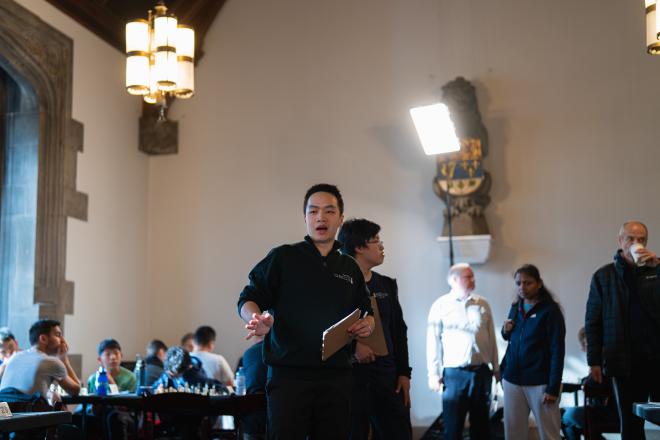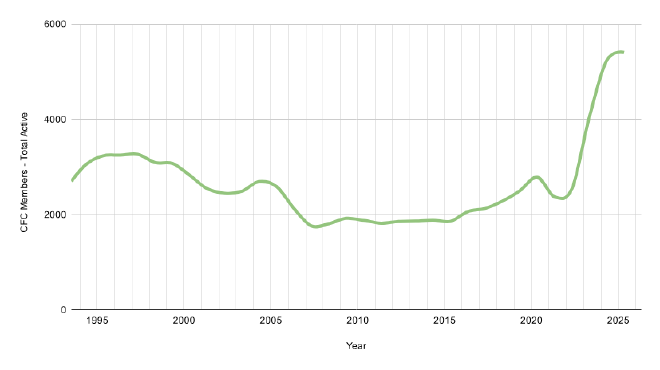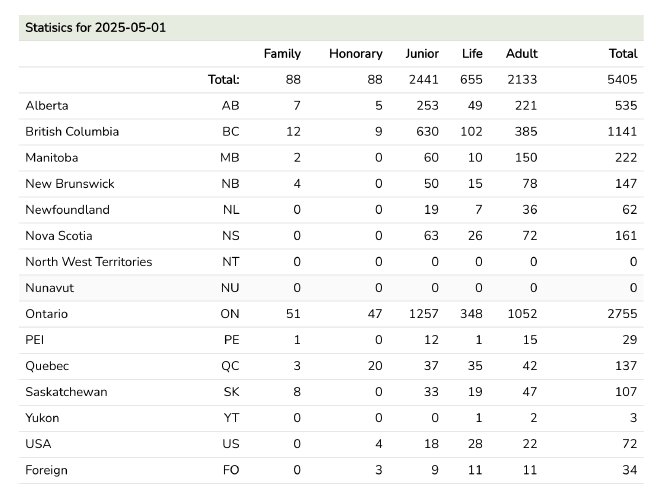Chess Plans 2025

Table of Contents
I’ve been involved in chess for a while and have been thinking about what to do next in the chess scene. Since this past April, I am no longer an Executive at the University of Toronto’s Chess Club (Hart House Chess Club) so I’ve had plenty of time to think about what to do next.
To recap, here are some of the projects that I worked on in the past few years.
- Data Visualization: Created chessviz in CSC316 Data Visualization—a D3.js project that visualizes Canadian chess data in innovative ways.
- Chess Technology: Developed tools published at chesstools.org to help organizers, arbiters, and players with tournament technology.
- Physical Computing: Built a fully-functional chess-tracking board in CSC490 Interactive Computing at the University of Toronto.
- Tournament Direction: Organized tournaments across multiple formats (blitz, rapid, classical, bughouse, Chess960, and variants) while engaging hundreds of community members.
- Media Production: Worked on videography and chess media—films, interviews, and recaps—exploring how chess content can be better presented.
- FIDE Arbitration: Became a FIDE arbiter, learning from Canada’s top arbiters to earn this distinguished certification.
- Leadership: Led the Hart House Chess Club as Secretary/Chair for two years.
- National Events: Organized the 2024 Canadian National Chess Championships.
- Governance: Joined the GTCL, OCA, and CFC as a Governor, contributing to chess governance across Canada.
From my experience with these many chess projects, I wrote a post about what I see as the main challenges and issues in Toronto / Canadian chess. With that in mind, I’ve begun a few different projects which I hope to accomplish in the coming year.
 |
|---|
| The growth for Canadian chess is slowing. See more here |
What’s Next? #
For me, I have the following main priorities in the next year for chess:
1. Technology and Tools #
I want to develop more resources that make chess organization seamless. This means creating tools that help organizers run tournaments more efficiently, help players find events easily, and keep the community engaged. I’ll also be talking with the community about what technological advances we need to modernize chess organization.
2. Digital Transformation for Toronto Chess #
I’m working on building a new website and digital presence for the Toronto chess community, with a particular focus on developing a modern platform for torontochess.org.
3. 2026 Canadian University Chess Championship #
I’ll contribute to the CUCC by focusing primarily on enhancing the player experience.
4. New Chess Board Project #
I’m hoping to develop the next generation of digital chess through the development of a fully-featured smart-chess board focusing on ease-of-use, speed, accuracy, and price. This is an extension of the embedded chess project I worked on previously. The next goal is to bring tournament-ready chess technology to chess lovers at tournaments. What do I mean by this? We can design and develop a board that tracks pieces for tournament use. I’m hoping that this can be delivered for less than $50 per board and enable full communication using BLE, run on low-power mode, and connect without tons of wires to a centralized server perhaps utilizing MQTT technologies.
5. Data Driven Decision Making #
I’m going to push for more data analytics into decision making within Canadian federations and chess organizations. What I found challenging was having reliable data sources to make decisions within the Hart House Chess Club. The same goes for GTCL, OCA, and CFC—we lack a data-centric view of decision making. We oftentimes rely on anecdotal evidence. There’s got to be better ways and opportunities to showcase the impact that different events and initiatives have done. This will better prepare chess administrators to make decisions that improve the chess community as a whole.
Why I Stay Involved in Chess #
An International Master recently asked me this question, and it made me reflect deeply on my motivations for staying involved in chess administration.
Motivation 1 #
I think the interesting thing about chess is that there’s potential for growth. In all the organizations that I have worked at I’ve thought about what I enjoy about the work and time spent at the places. The answer for me has been that there is a ton of potential for learning, growth, and impact. We can impact so much change in organizations that are small to medium-sized or that are transforming. It’s also fun when you can actually see the impact you create. For comparison, I think about other sports like tennis, which has Tennis Canada and quite large, robust associations. Although I enjoy volunteering at their tournaments, the organization is much more developed compared to chess. The same goes for Hockey Canada and other major sporting organizations. To me, these other sports are much more developed compared to chess with more money, more resources, and more people engaged with the system. Chess still has a lot of work to do.
Motivation 2 #
My second motivation is that I think of both the privilege and the responsibility that I have. For me, it’s a privilege to have been given the opportunities, mentorship, and advice that many people have given me. So many people have put their belief in me through Hart House Chess Club elections, their attendance at events, and donations to the Chess Club—trusting me to move chess at U of T forward. I think those motivations back then carry forward to even after leaving the Chess Club’s Executive. It’d be a waste to not work on building and utilizing the skills I’ve learnt while I still can.
Motivation 3 #
I think the biggest goal is that I want to see chess reach newer audiences and keep people engaged. I think the fundamental challenge in North American chess is that many students, after reaching university, no longer continue to play competitively. To me, it’s clear that there have to be solutions to this challenge and I think it’s an ultimate goal of mine to figure out what we need and use my skills I’ve gained to tackle this puzzle. I love puzzles that have a mixture of sociology and technology and I think a combination of both will help us tackle this challenge.
 |
|---|
| What we notice here is that the memberships for juniors are dwindling and the memberships for adults are increasing in 2025. Ontario, and the GTCL once again leads the pack with over 50% of the membership. |
Conclusion #
Now’s the time to enact change. I think there’s a moment in time right now right after the pandemic where we have peaked at the height of natural participation for tournaments and participating in chess. In order to maintain these levels, the CFC, OCA, and GTCL have to invest in these efforts. I took a look at the federation’s membership numbers and they don’t look promising going into the second half of 2025. We are reaching a plateau and clearly more work needs to be done. If you look at Toronto’s chess scene we are getting diluted and there’s not a ton of growth left with what we are continuing to do. I wrote about it extensively but we truly need a more cohesive effort from our leadership and federations above or else we risk not continuing the increase in numbers.
In my opinion, we need to improve our events’ quality, attract more organizers, and find ways to engage more people to stay involved in chess both as organizers but especially players. We’ve lost sight of where we are going and we need a coordinated effort from all levels of chess administration to help reach these goals.